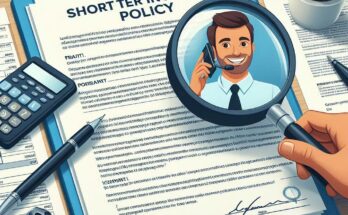It’s a contract between you and an insurance company where you pay a premium in exchange for financial protection against various risks related to driving. Whether you’re a new driver or someone looking to refresh your knowledge, understanding auto insurance can help you make better decisions and ensure you’re adequately covered.
What is Auto Insurance?
Auto insurance is essentially a safety net for drivers. It protects you financially in case of accidents, theft, or other issues related to your vehicle. Depending on your policy, it can cover repair costs, medical expenses, and even legal fees if you’re involved in a lawsuit.
Why is Auto Insurance Important?
Having auto insurance is not just a legal requirement in many places, but it also provides peace of mind. It helps you avoid substantial out-of-pocket costs in the event of an accident or other unexpected incidents. Without insurance, you could face significant financial strain if something goes wrong.

Types of Auto Insurance Coverage
Understanding the different types of coverage can help you tailor your policy to your needs.
Liability Insurance
Liability Insurance is the most basic form of auto insurance and is often required by law. It helps cover the costs if you’re found responsible for an accident that causes damage or injury to others.
Bodily Injury Liability
This type of coverage pays for medical expenses and other damages if you injure someone else in an accident. It can also cover legal fees if the injured party decides to sue you.
Property Damage Liability
This coverage helps pay for repairs or replacement of someone else’s property that you damage in an accident. It’s essential for protecting you from costly repairs or replacements.
Collision Coverage
Collision Coverage helps pay for repairs to your vehicle if you’re in an accident, regardless of who is at fault.

Uninsured/Underinsured Motorist Coverage
If you’re in an accident with someone who doesn’t have enough insurance to cover the damages, Uninsured/Underinsured Motorist Coverage can help cover the costs.
Personal Injury Protection (PIP)
Personal Injury Protection (PIP) pays for medical expenses for you and your passengers, regardless of who caused the accident.
Gap Insurance
If your vehicle is totaled, Gap Insurance covers the difference between what you owe on your car loan and its actual cash value. This is especially useful if you have a loan or lease on your vehicle.

Understanding Auto Insurance Terms
To navigate the world of auto insurance effectively, it’s essential to understand some key terms.
Premium
The premium is the amount you pay for your insurance coverage, typically on a monthly or yearly basis. Your premium is influenced by various factors, including your coverage level and driving history.
Deductible
The deductible is the amount you must pay out-of-pocket before your insurance coverage kicks in. A higher deductible generally means a lower premium, but it also means you’ll pay more if you need to file a claim.
Coverage Limit
The coverage limit is the maximum amount your insurance company will pay for a claim. It’s important to choose limits that provide adequate protection without leaving you underinsured.
Exclusions
Understanding what’s excluded can help you avoid unexpected surprises when filing a claim.
How Auto Insurance Works
Auto insurance might seem complex, but it boils down to a few key processes.
The Role of Premiums
When you pay your premiums, you’re essentially buying financial protection. The amount you pay is based on the type and amount of coverage you choose, as well as your risk profile.
How Claims Are Filed
If you need to use your insurance, you’ll file a claim with your insurer. This involves providing details about the incident and any associated costs. Your insurer will then assess the claim and determine how much compensation you’re entitled to.
The Claims Process
The claims process involves several steps, including investigation, assessment, and payment. It can take time, so being patient and providing accurate information can help speed things up.

Factors Affecting Auto Insurance Rates
Several factors influence your auto insurance rates. Understanding these can help you manage your costs.
Driving History
If you have a history of accidents or traffic violations, you might face higher premiums.
Vehicle Type and Model
The type and model of your vehicle impact your rates. High-performance cars or those with expensive repair costs usually have higher premiums.
Location
Where you live can affect your rates. Urban areas with higher traffic and crime rates often result in higher premiums compared to rural locations.
Age and Gender
Statistical data shows that younger drivers and male drivers often face higher rates due to perceived higher risk.
Credit Score
In many regions, a good credit score can help lower your insurance rates.
Tips for Choosing the Right Auto Insurance
Selecting the right auto insurance involves more than just picking the lowest premium.
Assess Your Coverage Needs
Evaluate your driving habits, vehicle type, and financial situation to determine the level of coverage you need.
Look for Discounts
Many insurers offer discounts for various reasons, such as safe driving, having multiple policies, or installing safety features in your car.
Check the Insurer’s Reputation
A good insurer should be reliable and easy to work with.
Underestimating Coverage Needs
Don’t choose the minimum coverage just to save on premiums. Ensure you have enough coverage to protect yourself financially in the event of an accident.
Failing to Update Your Policy
As your circumstances change, such as moving to a new area or buying a new car, update your policy to reflect these changes.
Ignoring Discounts
Be proactive about finding and applying for discounts. They can significantly reduce your premium without compromising coverage.
Conclusion
Whether you’re new to auto insurance or looking to reassess your current policy, taking the time to learn and compare options can help you find the best coverage for your needs.
FAQs
What should I do if I get into an accident?
If you get into an accident, ensure everyone’s safety first. Contact the police if necessary, exchange information with the other party, and notify your insurance company to start the claims process.
What is the differences betweenness collision and comprehensive coverages?
Collision Coverage pays for damage to your vehicle from a collision, while Comprehensive Coverage covers damage from non-collision events like theft, vandalism, or natural disasters.
Do I need auto insurance if I drive infrequently?
Yes, you still need auto insurance even if you drive infrequently. Insurance helps protect you from financial loss in case of an accident or other issues, regardless of how often you drive.
How often should I reviews my autos insurances policies?
It’s a good idea to review your policy annually or whenever significant life changes occur, such as moving, getting a new vehicle, or changes in your driving habits.



